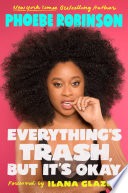Everything’s Trash, But It’s Okay is Phoebe Robinson’s second book. It is a group of essays about various topics. It is a little under two years since I read her first book, You Can’t Touch My Hair And Other Things I Still Have to Explain, but the conditions are dramatically different. I borrowed both books from the library, but while I finished reading the first book in a single, brief sitting, I had to renew this book three times. Side note: my library has a limit of two renewals, but there was no waiting list so the librarian took pity on me. It basically took me almost three months to read this book, but to be fair, I only read it while eating during lunch breaks except on one freakishly warm winter day when I sat on a bench in the sun and read a good chunk.
Everything’s Trash, But It’s Okay sounds more like Robinson’s performing voice so it is good to see that she has considerably relaxed since her first book. Unfortunately this welcome adjustment poses new challenges, and the following critique probably applies to me as well. She goes on long tangents then I forget the original subject of the essay, and occasionally I will have to backtrack to recover the thread that I lost. It only gets worse if the time between readings increases, which is probably why it took me longer to read it than books with a more conventional narrative and prose style. I think that this book is best read when you can devote an ample amount of uninterrupted time to reading it than reading it in multiple sittings. In other words, don’t be me and sabotage your enjoyment. Honestly I cannot walk a few steps without having multiple interruptions so I suppose it was better to read it than not.
My favorite part of Everything’s Trash, But It’s Okay is when Robinson discusses her financial situation and struggling to get a footing in the world of comedy. It felt vulnerable, and it was honest, funny and scary in a less self-conscious way than her other essays in which the humor is used to defuse the tension of the subject, but is still organic to her style, which I am more familiar with than when I read her first book because I listen to the now defunct podcast 2 Dope Queens and Sooo Many White Guys. Her book is strongest when she talks about her life story and not her positions on issues. When she does the latter, she takes a firm stand then adds so many diplomatic qualifiers that it feels as if it would be easier for everyone if she did not take the firm stand at all, especially when those firm stands did not seem so controversial to me. Who knows? Maybe I do the same thing too. Nawwww, no one has ever accused me of being diplomatic, and you can literally hear me think when I am trying not to be blunt and hurt people’s feelings. It is a gender normative girl thing, which I am not instinctually good at and then when I do it, I end up completely undercutting my argument so I think that it is more a pet peeve of my attempts to compromise than a harsh criticism of her as a person.
Everything’s Trash, But It’s Okay is at its most comfortable when she dishes about life as a newbie celebrity on the fringes of massive fame, particularly her obsession with U2, but also when she is preparing for a photo shoot or discussing the less glamorous aspects of getting a gig then balancing the regular paycheck with the potential for a bigger platform. Anyone can talk about hot button issues such as feminism or racism, and with an ounce of common sense, which is not so common, find themselves on the right side of history, but only Robinson can tell her personal story so instead of starting with an essay set out to tackle world peace, writing about her life reflects how she personally deals with those issues instead of sounding like a position paper. The majority of the book starts as a position paper then gradually transitions into the personal, but I would have preferred if Robinson did the reverse. Last year I read Retta’s book, So Close to Being the Sh*t, Y’all Don’t Even Know, and I feel as if Robinson needs to approach Retta and ask for mentoring while still being herself.
Robinson has made some real strides in capturing her voice and embracing herself, but still has quite a way to go before she can package it in a way that is still an easily consumable product without diluting herself. I applaud her efforts to take a stand on the side of the angels, but she should not feel guilty if she puts that mission in second place to what she cares about most. I think that if she devotes herself to what she loves, she can still effectuate change and make a difference in a unique way instead of losing herself in the overwhelming urgency of the world’s problems. I will definitely read her next book and wish her well since she appears to be on the right track, but unless you are already a fan of her work, I do not think that it is worth the effort.

Everything’s Trash, But It’s Okay
Stay In The Know
Join my mailing list to get updates about recent reviews, upcoming speaking engagements, and film news.




